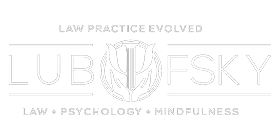Few life situations present as much challenge in a legal context as divorce involving young children. Along with innate drives to nurture and care for our children are entrenched self-concepts built around identities a a parent, a wife, a husband, etc., that become threatened. All of this takes place while spouses try to deal with very real financial challenges and changes to daily routines, friends, etc. The typical way in which the ego reacts to these largely thought-driven concepts is to become defensive and do what it perceives as necessary to protect its identity.
It is little surprise, as the ego wages its battle for survival, that parents come to experience inner conflict and confusion as on some level they sense that their defensive reactions, aimed at preserving the self-concept, are at odds with the best interests of the children.
In this context, mindfulness can be seen as the antidote to habitual reactions and conditioned responses aimed at ego preservation. Heightened present-moment awareness and consciousness cultivated through mindfulness practice, is a primary means through which one may begin to dis-identify from ego-driven thoughts such as “how things must be,” “how things are wrong,” etc., and begin to access an inner wisdom far more conducive to identifying an optimal course of action able to serve the best interests of all involved, including children and parents.
Unfortunately, our civil justice system is largely built on an adversarial model often serving to intensify conditioned responses springing from egoic notions that “I am right, you are wrong,” etc. In this way, the prevailing system often succeeds in amplifying the most negative aspects of one’s personality.
One common belief about a holistic approach to divorce is that both spouses must be open to this mindful approach as a means of working through this situation in an optimal fashion. Often, however, it only takes one spouse to embrace this approach and work towards dis-identifying from his or her habitual reactions. When one spouse becomes able to do this, he or she stops fueling a fire contributing to the escalation of destructive responses in the other spouse. Within this dynamic change the other spouse may begin to let go of his or her conditioned responses and work toward the best solution for all involved.
To learn more about mindful approaches to divorce and child custody, contact Attorney Michael Lubofsky at (415) 508-6263, or visit http://www.mindfulaw.com.
